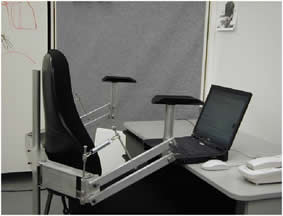Berkeley Ergonomic Arm
Berkeley Ergonomic Arm is a practical ergonomic intervention and support system to improve productivity and reduce work place ergonomic-related injuries. Berkeley Ergonomic Arm dynamically enhances musculoskeletal support and comfort during sitting tasks at the computer or standing at a bench top or manufacturing station. The aim is to reduce the likelihood of cumulative trauma injuries to the upper extremities.Business Opportunity:
This is a ground floor opportunity with enormous upside market growth potential. Berkeley Lab is seeking a qualified partner(s) to work with us in a Phase III collaborative effort to refine and commercialize the new Berkeley Ergonomic Arm, a practical ergonomic intervention system to improve productivity and reduce work place injuries.
The objective of the Berkeley Ergonomic Arm project is to design and develop practical ergonomic support devices suitable for wide market acceptance AND to "jump start" commercialization through private sector collaboration. Berkeley Lab's goal is to provide, through partnering with the private sector, a significant public benefit in an area that is ubiquitous and in need of improvement. The planned R&D effort is currently undergoing functional testing of various prototypes.
Phase I Prototype Development (completed): Berkeley Lab set up the Ergo lab and testing facilities; established generated concepts; and fabricated several prototypes of the Berkeley Ergonomic Arm.
Phase II Functional Testing (ongoing): Refine evaluation criteria; acquire additional instrumentation; measure muscle activity; and improve engineering prototypes. Towards the culmination of Phase II, we plan to hold an industry manufacturing forum on the Berkeley Ergonomic Arm product and plan to select an industry partner for Phase III production prototypes and subsequent commercialization.
Phase III Product refinement through Industry Partnering and Collaboration (future): Finalize product requirements; optimize design for manufacture; produce production prototypes; conduct initial product field testing.
Status: U.S. Patent #
Application:
The final Berkeley Ergonomic Arm product (s) will provide ergonomic support, incorporate various built in ergo enhancements to minimize strain, and protect the worker or manager from disabling workplace injuries. Some models will directly replace the conventional office chair. Potential Benefits:
- Many potential applications include:
- Office environment – computer work - Manufacturing environment – micro/light assembly - Lab environment – repetitive handwork - Parts inspection - Fume hood work - Biological Safety cabinets - Microscope work - Garment Industry - Production genomics work - Life Sciences benchwork - Vocation Rehabilitation accommodations - Other applications requiring repetitive hand, arm, or upper body - Workplaces safe from hazardous conditions have lower costs due to decreased lost time, absenteeism, worker compensation premiums, etc. Ergonomics programs have been shown to be cost effective for similar reasons. In addition, ergonomic improvements may result in increased productivity and higher product quality. The LBNL ergonomic intervention system can facilitate and enhance the benefits of a company’s ergonomics program by:
- Decreasing injury risk, lost and restricted work days - Increasing efficiency and sustain productivity; better mechanical advantage - Dynamically supporting upper extremities of an individual’s normal range of work movements; allows worker to use optimal posture - Lessening Stress and Fatigue and relieve Employee Discomfort - Preventing onset of musculoskeletal disorders or aggravation of pre-existing ergonomic injuries - Reducing costs of employee injuries (medical, indemnity, productivity, Workers Compensation premiums, etc.), thus bringing a return on investment - Improving morale Industry Partner Participation:
Phase III would be best carried out with a full partner bringing various capabilities and resources to the project. The ideal partner will be positioned and capable of bringing all of the following to the partnership.
- Keen interest and capabilities in the project - Significant marketing capability and a business leadership position - Successful track record in new product development - Ability to bring funds to the project and potentially form a CRADA (Cooperative Research and Development Agreement) with Berkeley Lab - Qualified technical and management personnel to plan, organize, and carry out mutually developed work plans
Schedule, Cost, and Contract:
Depending on Partner’s objectives and product design requirements, we visualize an approximate 12 to 18 month Phase III collaborative effort. Costs to be determined based upon mutually agreed scope and sharing of responsibilities. Access to intellectual property (IP) is available and will be addressed in a specific IP agreement. A standard CRADA (Cooperative Research and Development Agreement), pro-forma available upon request, is anticipated for the commercial agreement between Berkeley Lab and the Industry Partner.
Partnering Mission:
Berkeley Lab is a U.S. Department of Energy National Laboratory managed by the University of California. Our mission includes partnering with industry to commercialize our inventions.
Attached files:

Patents:
US 6,923,505
Type of Offer: Licensing
« More Biotech Patents
